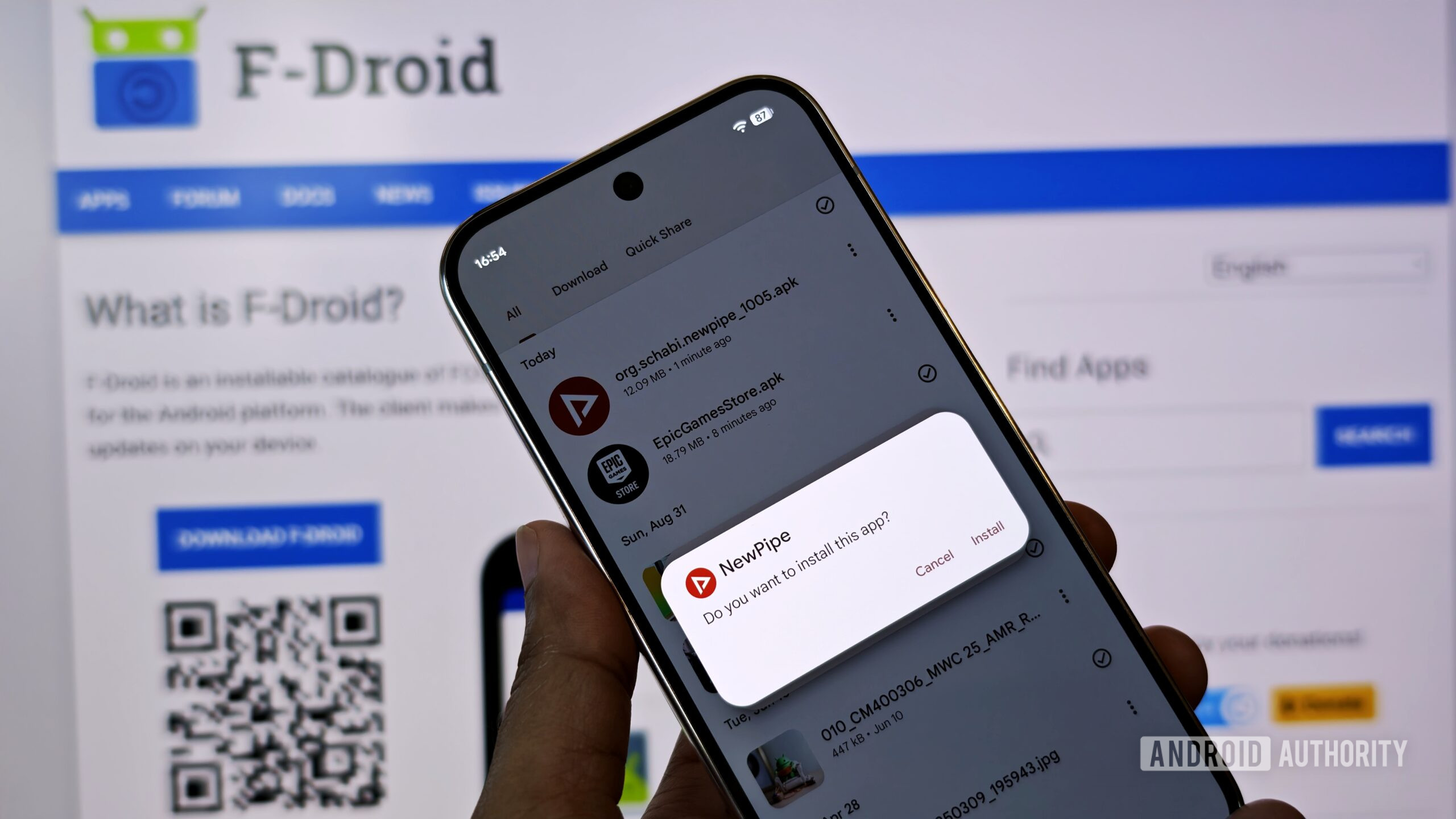
Mishaal Rahman / Android Authority
Yesterday, Google and Epic lastly reached an settlement to settle their years-long authorized dispute. If authorised by the choose overseeing the case, the settlement would resolve the lawsuit Epic filed in 2020 to problem Google’s stranglehold on Android app distribution. As a part of the settlement, Google plans to make sweeping adjustments to Android, which can be applied in a future model of subsequent yr’s Android 17 launch. The corporate is growing a brand new system that can enable customers to simply set up third-party app shops, lowering the friction of getting apps from outdoors of Google Play.
This timing is notable, as subsequent yr can be when Android’s new developer verification necessities will go into impact. Starting in September 2026, Android will block customers from putting in apps made by unverified builders. Though Google says that sideloading isn’t going wherever, some critics are involved this variation will kill various app shops like F-Droid. That’s why Google’s settlement with Epic has sparked hope that Android’s sideloading restrictions can be eased or eradicated totally subsequent yr.
When you had been hoping for that, then I’m sorry to disappoint you, as a result of Google’s proposed adjustments to Android gained’t save sideloading as we all know it. They are going to, nevertheless, make the Android app ecosystem extra aggressive, benefitting customers by lowering costs and enhancing app availability. Right here’s how.
Inserting third-party app shops on equal footing with the Google Play Retailer
The largest change coming to the Android OS is assist for “Registered App Shops.” A “Registered App Retailer” is a third-party app retailer that Google has licensed. The certification course of hasn’t been outlined but, however the settlement phrases state that Google might create “cheap necessities” for certification, comparable to a evaluate of the app retailer and the cost of a “cheap” charge that covers operational prices. This charge might not be “income proportionate,” which means it can’t be primarily based on how a lot income the app retailer generates.
As soon as an app retailer is licensed, customers can set up it with a single click on from its web site. It will provoke a “single retailer set up display” that makes use of “impartial language” reasonably than the present warnings that Epic argues deter customers from continuing.
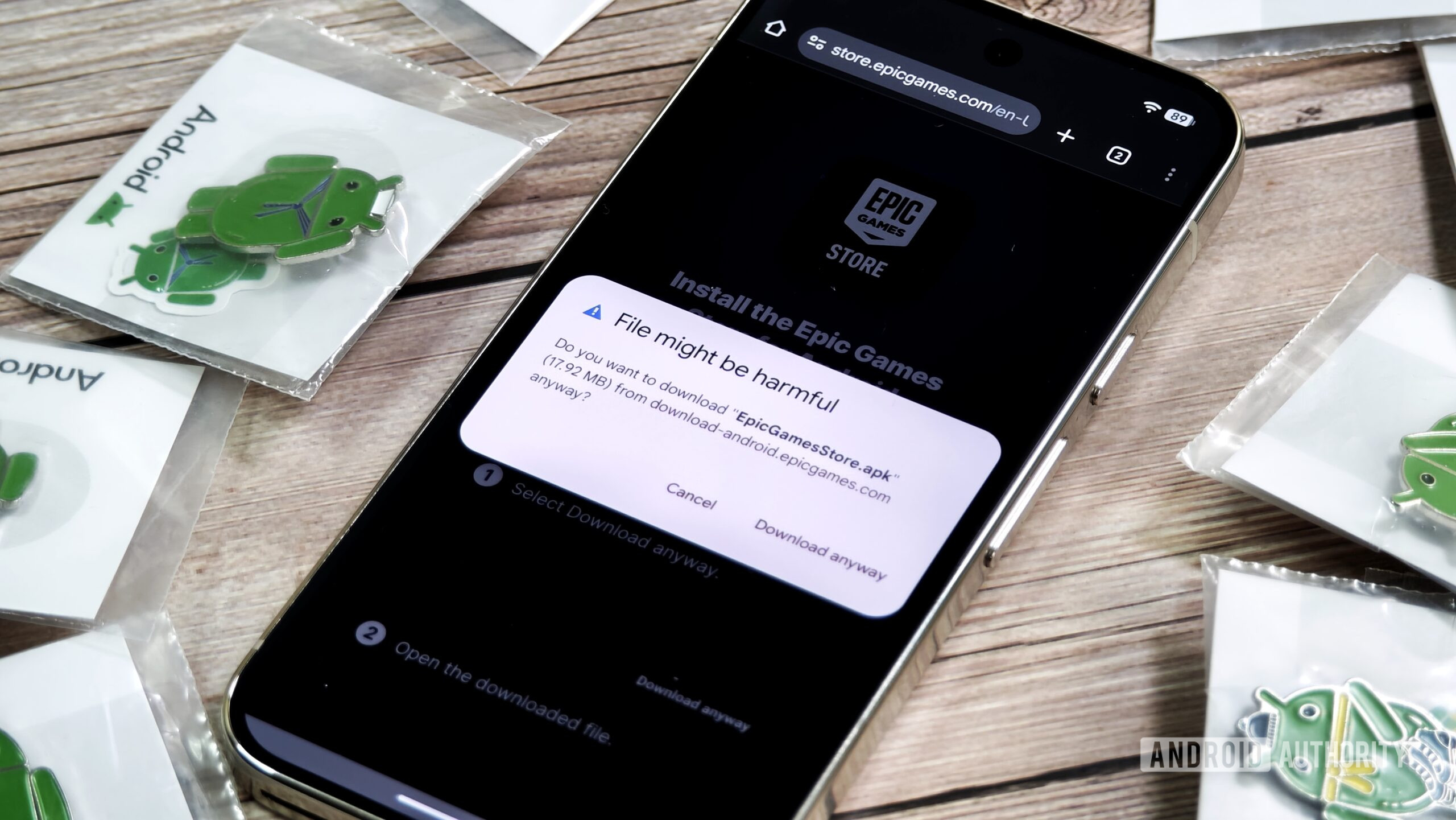
Mishaal Rahman / Android Authority
A photograph exhibiting one of many many present dialogs that customers should click on via to put in the Epic Video games Retailer on Android.
Importantly, this set up display may even “grant the permission to the shop to put in apps.” It’s unclear whether or not this refers back to the INSTALL_PACKAGES permission, which permits shops to put in apps with out person intervention, or REQUEST_INSTALL_PACKAGES, which requires the person’s consent for every set up. At the moment, solely preinstalled app shops just like the Google Play Retailer can have the extra highly effective INSTALL_PACKAGES permission. Third-party app shops should request the latter, which provides additional steps for the person.
For years, Epic has argued that Android makes it onerous and scary to put in and use third-party app shops. In comparison with the seamless expertise throughout the Google Play Retailer, putting in an app from another supply includes much more friction. Customers should navigate a multi-step course of full of prompts that use discouraging language. Google has lengthy argued this movement is important to guard customers, and whereas there’s definitely reality to that, it additionally weakens any third-party try at dethroning the Play Retailer.
A screenshot gallery exhibiting a number of the key steps that should be taken presently to put in the Epic Video games Retailer after which set up a sport from the shop.
By reducing down this multi-step course of, third-party app shops might see higher adoption. If extra customers flock to those various shops, then extra builders will comply with, and vice versa. Finally, some third-party Android app shops might even develop into aggressive with Google Play.
Whereas Google definitely doesn’t wish to put third-party app shops on a extra degree enjoying area with its personal, it doesn’t have a lot selection. Epic gained its lawsuit towards Google and was initially in search of to pressure the corporate to permit third-party shops on the Play Retailer and to open up its app catalog. Now, each events have settled on a unique method that can be applied worldwide.
To assist these “Registered App Shops,” Google should make core adjustments to the working system. These adjustments can be launched “in a model of the following main Android launch” — in different phrases, Android 17. Since this may doubtless require adjustments to the Android SDK, we most likely gained’t see the characteristic roll out till Android 17 QPR2 in December 2026, assuming Google sticks to its present launch schedule. Google is committing to supporting this characteristic via June 30, 2032, giving third-party app shops roughly six years to construct themselves up and tackle the Play Retailer.
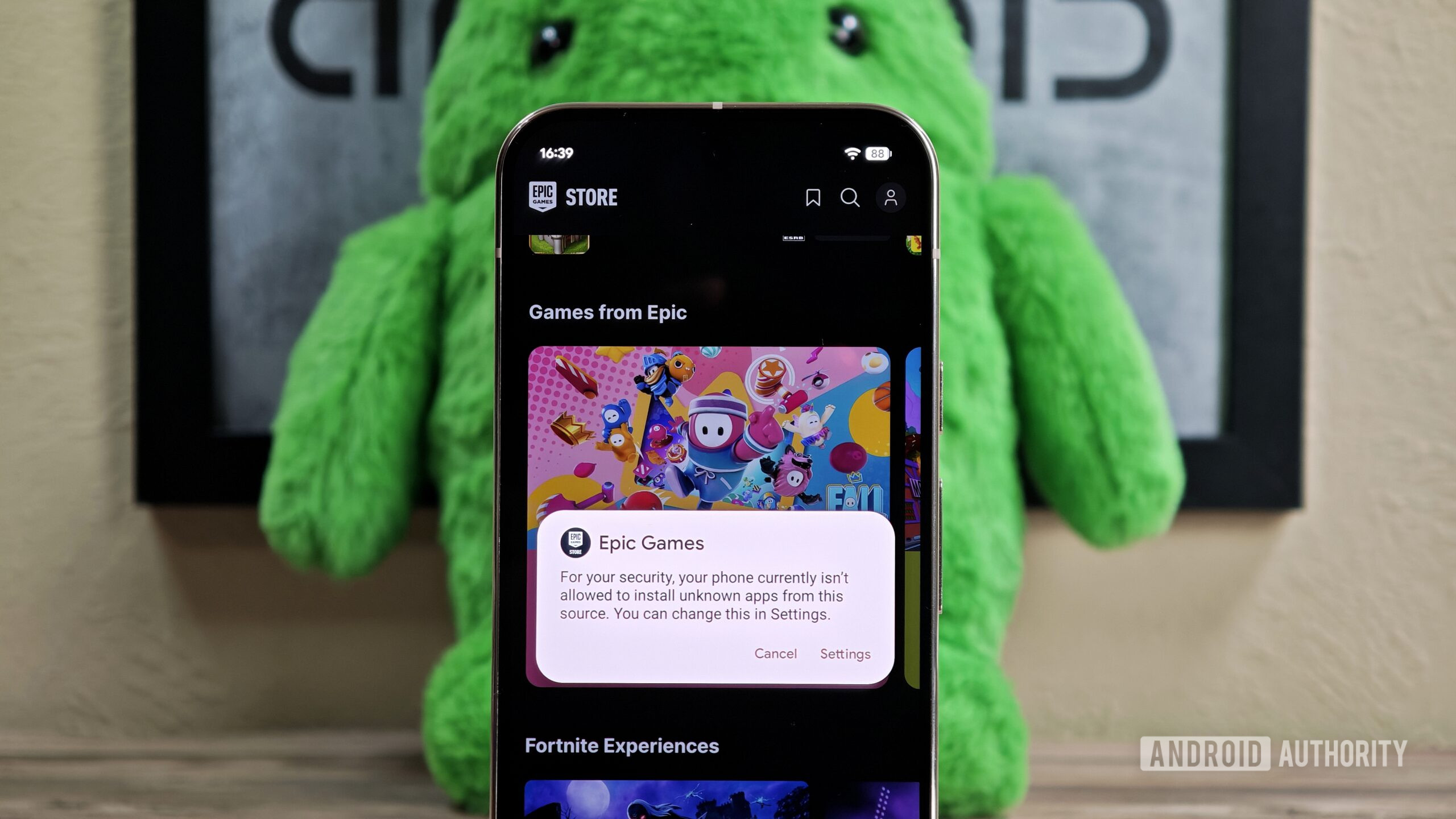
Mishaal Rahman / Android Authority
Merely making it simpler to put in and use third-party app shops isn’t sufficient to place them on a degree enjoying area with the Play Retailer, although. That’s why Google is committing to a number of different adjustments that restrict its means to discourage OEMs or builders from working with third-party app shops.
For starters, Google can now not forestall OEMs or carriers from preinstalling third-party app shops or inserting them on the house display. Beforehand, OEMs and carriers would signal agreements that restricted these actions in change for funds, revenue-sharing offers, or particular entry to Google services. Google is now agreeing to chorus from making such offers for 3 years from the date the settlement goes into impact.
As well as, Google is agreeing to cease sharing Play Retailer income with any entity that distributes Android apps or that has acknowledged its intention to launch a competing platform. This ensures Google can not repay current or potential rivals to maintain them from competing with the Play Retailer. For instance, Google allegedly thought of sharing income with Samsung to discourage it from build up the Galaxy Retailer, an motion this settlement now explicitly prohibits for at the least three years.
Lastly, Google agrees that it’ll “allow third-party app shops to function on Android freed from cost” via June 30, 2032. Because of this direct downloads from developer web sites and third-party shops will proceed with none charges. The one exception is that if a obtain originates from a hyperlink inside an app (excluding net browsers) that was put in or up to date from the Google Play Retailer. Mainly, Google is agreeing to not impose extra monetary burdens on third-party app shops or on apps downloaded from them. Notice that this doubtless doesn’t prohibit Android’s developer verification necessities, as these don’t instantly impose charges on app downloads themselves.
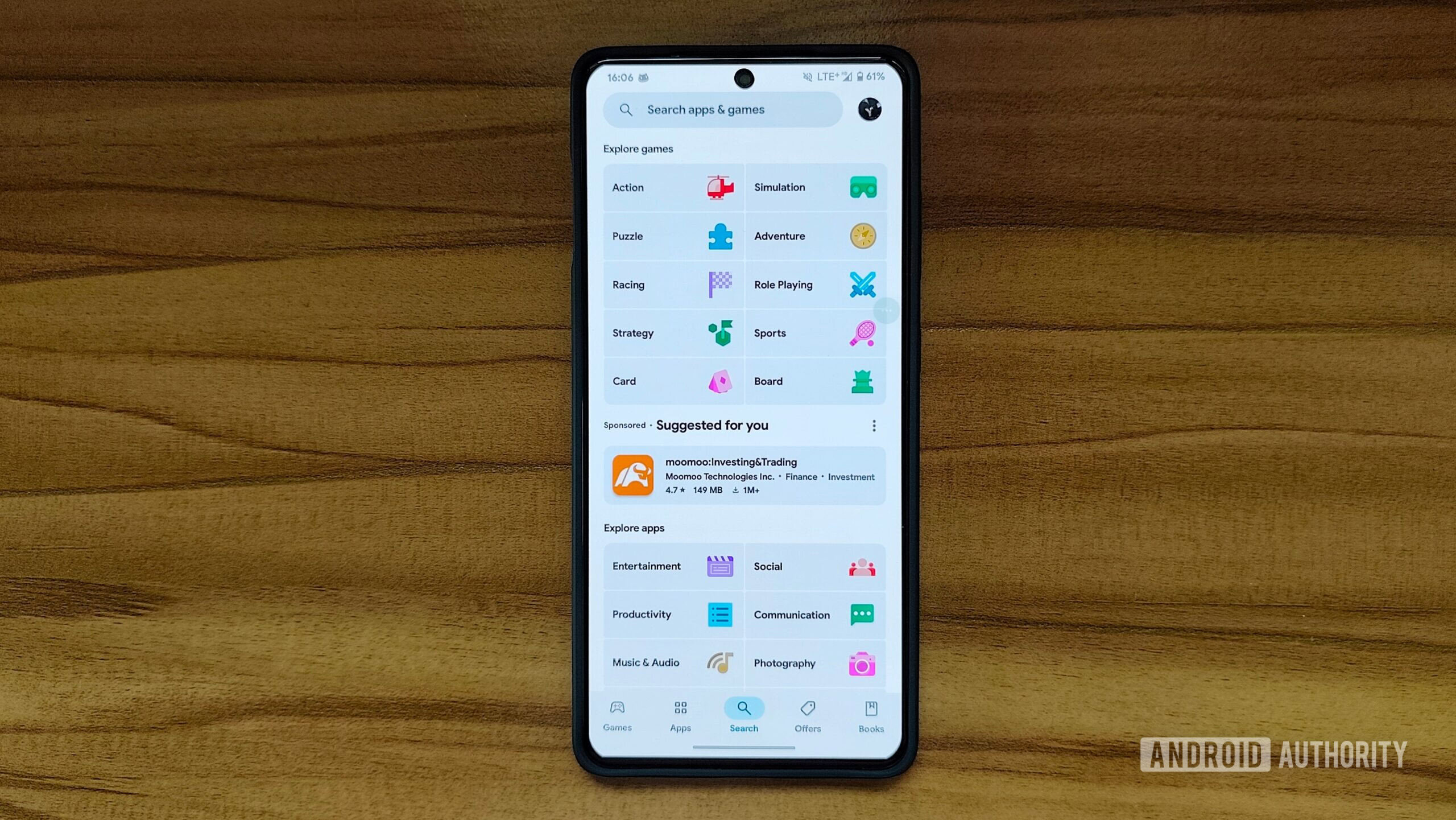
AssembleDebug / Android Authority
Whereas these adjustments will put third-party Android app shops on a extra degree enjoying area with the Google Play Retailer, they don’t resolve all of Epic’s complaints. Epic additionally efficiently argued that Google’s Play Retailer insurance policies had been far too restrictive and anticompetitive, so Google can be proposing a number of adjustments to its guidelines for various billing and developer-user communication.
Builders now have extra freedom to decide on which app retailer they wish to launch on
As a substitute of forcing all apps on the Google Play Retailer to make use of Google Play Billing for in-app digital transactions, Google will quickly enable builders to make use of various cost choices. These can embody exterior net hyperlinks or various in-app cost programs. If a developer chooses to point out another possibility, it should be displayed side-by-side with Google Play Billing, although they’re free to spotlight totally different pricing or different advantages.
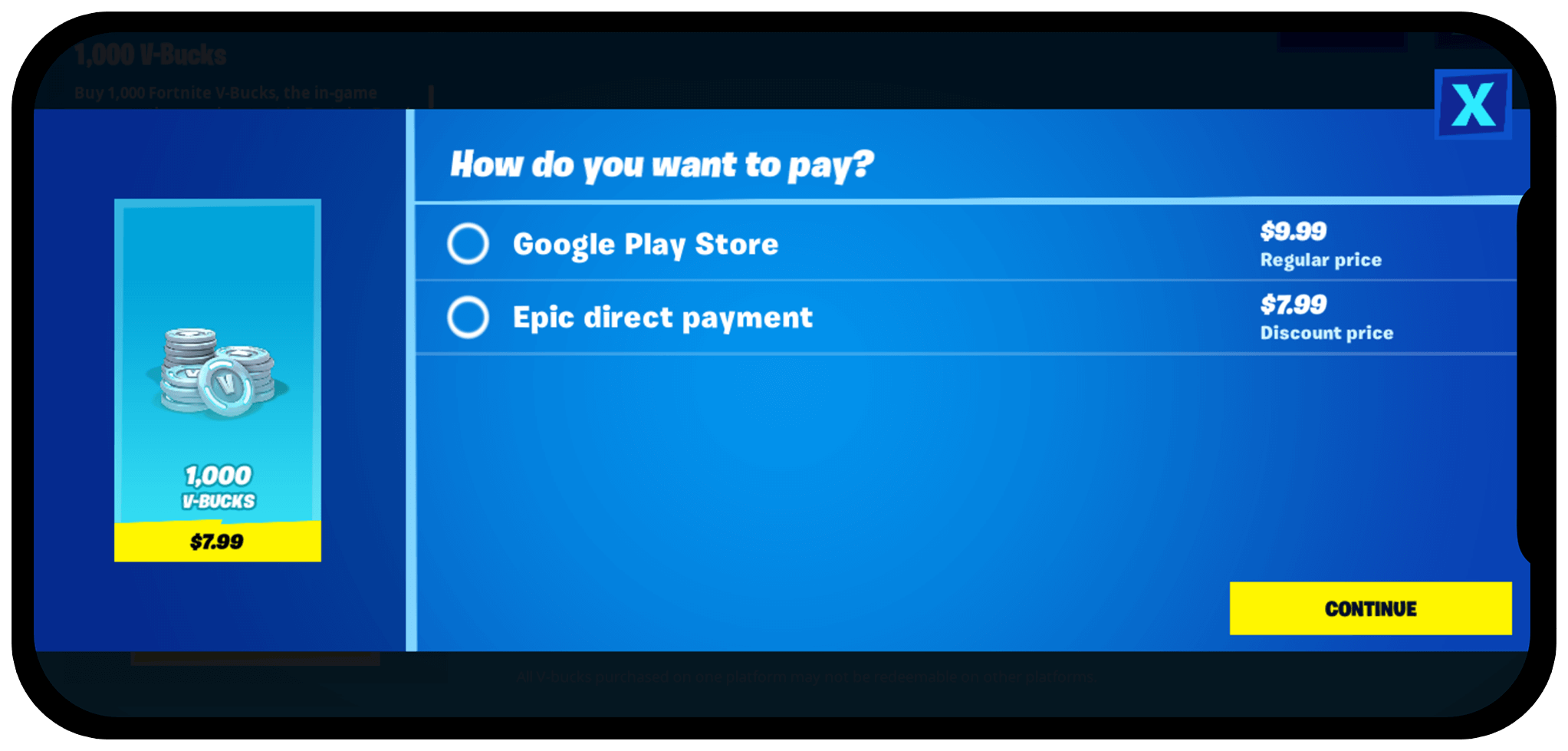
The cost display that bought Fortnite kicked off the Play Retailer again in 2020.
It is a main change, as Google beforehand required most builders to solely use its Play Billing system for a lot of in-app purchases. Google fees a service charge of 15% on the primary $1 million of a developer’s income and 30% on all earnings after that. This ends in a big chunk of many corporations’ income going to Google, a charge many have argued is extreme. By permitting builders to supply various choices, they’ll doubtlessly maintain extra of their income and go financial savings on to customers with decrease costs.
Nevertheless, Google can nonetheless take a service charge on transactions accomplished with various cost strategies. For in-app and linked purchases in video games, Google can cost a charge of as much as 20% for purchases that “affect sport outcomes, gameplay progress price, or participant energy,” in addition to for purchases with “random outcomes” (i.e., loot packing containers).
Google can even cost an as much as 20% charge for any transaction that happens on exterior web sites after a person clicks a hyperlink in an app. To trace these transactions, Google will present an API to obtain cost and accounting info. The corporate agrees to not use this API for some other function and may solely declare a service charge for transactions accomplished inside 24 hours of the person clicking an in-app hyperlink.
For different classes, Google can cost a service charge of as much as 9%. This consists of:
- Purchases of “content material, ranges, occasions, or beauty objects.”
- In-app subscriptions for apps.
- In-app and linked purchases in non-game apps.
This 9% charge additionally applies to the upfront value of paid apps on the Play Retailer.
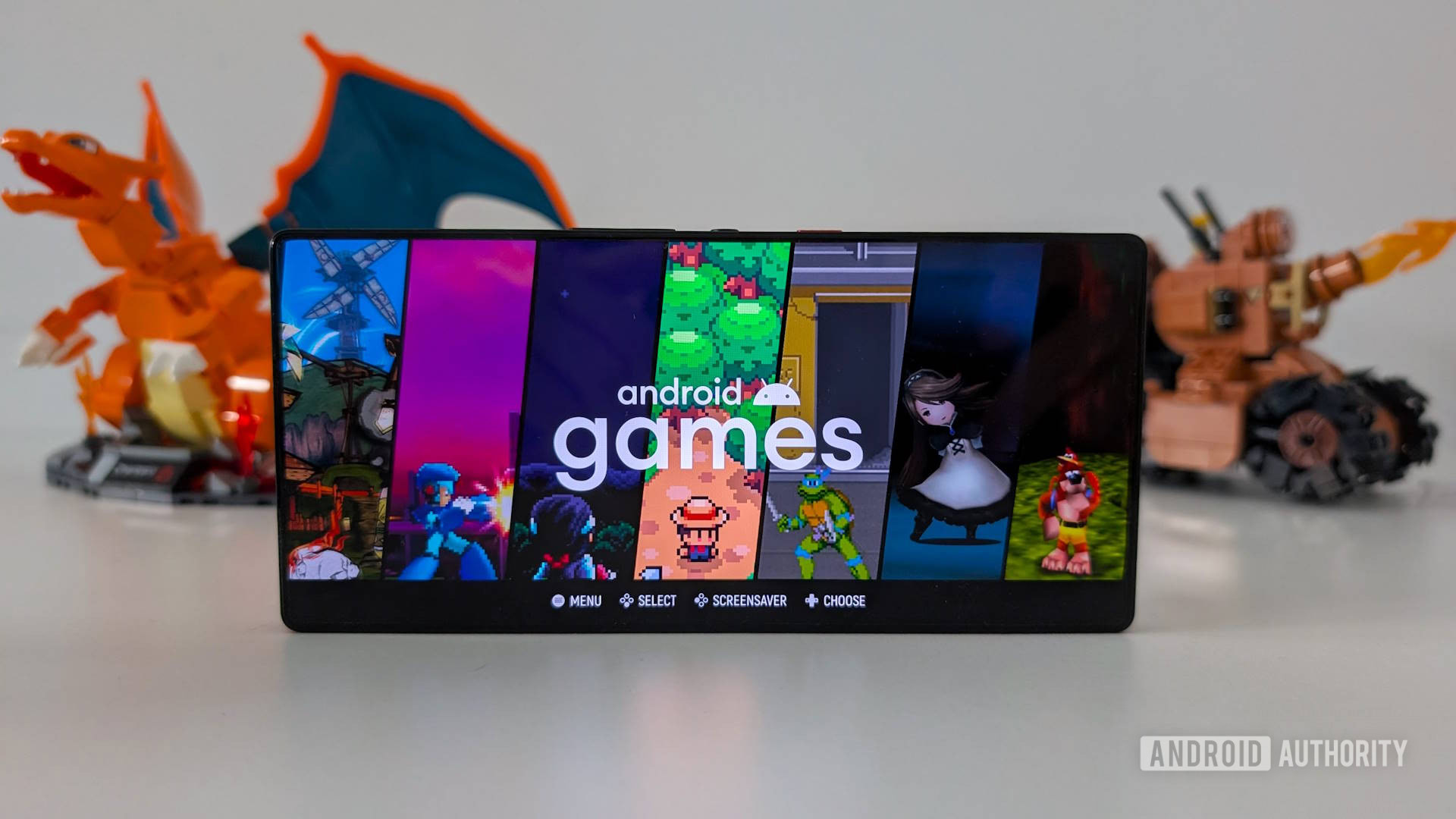
Nick Fernandez / Android Authority
Whereas the precise charges haven’t been finalized, Google says this new service charge construction will begin no later than March 31, 2026, and can final via June 30, 2032. Curiously, there may be a quick interval the place these charges don’t apply, as builders can start exhibiting various cost strategies as early as December 3, 2025.
To make sure builders can freely use this characteristic, Google can be making a number of different commitments. The corporate is not going to:
- Prohibit builders from speaking with customers about various cost strategies.
- Power builders to set costs primarily based on which billing system is used.
- Discriminate towards them for utilizing another cost methodology.
- Impose unreasonable restrictions on the design, placement, or messaging of different cost choices, apart from the requirement that they seem side-by-side with the Google Play Billing button.
Lastly, for a interval of three years, the settlement prevents Google from paying builders to favor the Play Retailer over competing app shops in the US. Particularly, Google can not supply funds or different incentives to a developer for launching an app first or solely on the Google Play Retailer if it delays the app’s launch on a competing retailer within the U.S. Google can be forbidden from paying builders to stop them from releasing totally different variations of their apps with unique options on third-party shops within the U.S.
Nevertheless, Google can nonetheless supply incentives for builders to launch on the Android platform first or solely. When making these “Android-first” offers, Google should enable the developer to freely select which Android app retailer they use for distribution inside the US. This prevents Google from creating an “Android-first” deal that’s secretly a “Play Retailer-first” deal for the U.S. market.
Total, Google’s proposed adjustments will go a good distance towards making third-party Android app shops extra aggressive. The adjustments particularly profit Epic, which has lengthy sought to ascertain its Video games Retailer as a significant platform for Android video games. The friction in putting in the Epic Video games Retailer can be considerably diminished, and Epic can be free to strike agreements with OEMs to preload its retailer. The corporate may even have extra leeway to make unique offers with builders, a observe it has used efficiently on PC.
For builders not seeking to create their very own shops, the quick advantages are extra modest. Whereas they’ll quickly supply various cost choices, Google will nonetheless acquire a service charge, limiting the potential financial savings. The true long-term benefit is the potential for a extra aggressive market. If these adjustments enable third-party shops to achieve vital traction, builders could have extra platforms to select from, which might result in extra favorable phrases for everybody.
In the end, this can be a foundational shift for the Android ecosystem. Whereas it gained’t save sideloading as we all know it, it guarantees extra selection for customers. In the long term, this elevated competitors might result in a greater diversity of apps, unique content material on totally different shops, and doubtlessly decrease costs for in-app purchases. It’s not an in a single day revolution, however a significant step towards a extra open app market.
Thanks for being a part of our group. Learn our Remark Coverage earlier than posting.

